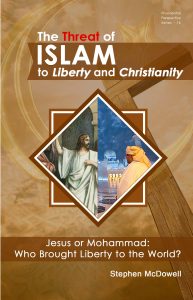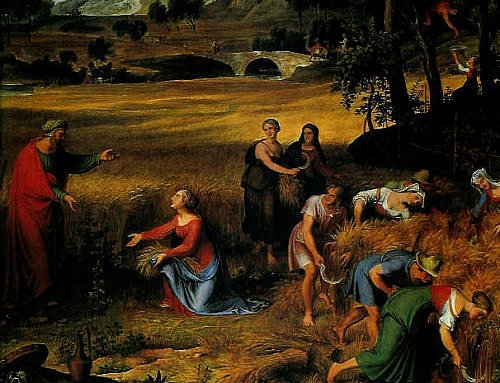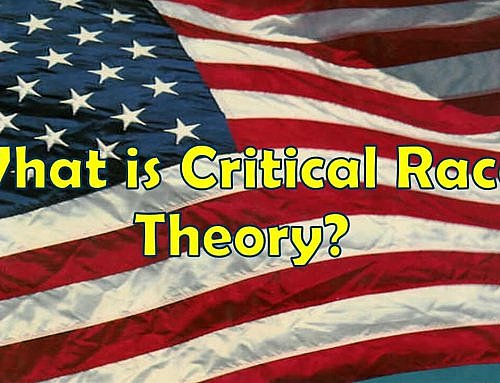By Stephen McDowell
Islam is one of the two greatest external threats to Christianity in the twenty-first century. Statism is the other.[1] Though not as old as statism, Islam has been at war with Christianity since its inception by Mohammad in the seventh century. This article introduces the booklet The Threat of Islam to Liberty and Christianity which provides a brief overview of the history of Islam and its teachings in order to give proper context to this very grave danger that the free world faces.
and its teachings in order to give proper context to this very grave danger that the free world faces.
The historical overview of Islam presented in The Threat of Islam to Liberty and Christianity —which includes the Crusades, important battles stopping Islam’s spread throughout Europe, and Muslims’ influence in American history—reveals that its aggressive expansion and conflict with Christianity are normal. The ideological comparison of Christianity and Islam shows that Christianity produces liberty, while Islam brings oppression.
Many questions are also answered, such as: Is Islam a religion of peace? How should America deal with Islamic terrorists? What can we do regarding the threat of Islam to the Christian faith? Finally, there is good news: God is moving among many Muslims to bring them to Christ.
Worldview Matters
To properly understand America’s recent conflicts with Islamic terrorists, we must recognize that we are at war with a false religion, a false ideology. All religions are not the same. The religion or faith of a people is the life-blood of their society. It should carry nutrients and oxygen to feed the national body. Nations that have embraced Biblical Christianity, like America, have produced life, liberty, virtue, and prosperity. Islamic nations have produced death, bondage, corruption, and lack. The reason for this is that the religion or life-blood of Muslim nations carries little nutrients because their faith is in a god of human invention and not in the true and living God.
All worldviews are not the same. If you or a nation acts as if they are, serious consequences occur. It is important that we understand the basic ideas behind Islam and how they differ greatly from Christianity. A person’s worldview affects everything in his life, including how to view and deal with radical Islam today.
The Christian idea of man says that a person’s faith and worldview determine the condition of his heart and mind. Christianity teaches that man is fallen and his heart is given toward evil (Rom. 3:9-23; 7:18), though he does have the capacity to do good because every man is created in the image of God (Gen. 1:26) and has a conscience revealing good and evil to him (Rom. 2). People who have been converted (or internally born again) and/or influenced by Biblical morality and truth are especially likely to act civilly and right. History confirms that some people’s tendency toward evil is so strong they cannot be reached by reason. Such evil can only be overcome by force, which God has authorized civil authorities to wield (Rom. 13:1-7).
The Islamic worldview has a propensity to irrational evil, as witnessed from its history and also from its teachings. While not all Muslims have succumbed to aggressive militancy, a large number have, with little opposition from moderate Muslims. Today, the vast majority of Muslims do not embrace the terrorist activities of ISIS, Al-Qaeda, the Taliban, Hamas, Hezbollah, Boko Haram and other such groups. However, estimates of Muslims who do support such actions, at least in part, range from 10-20%.[2] With about 1.6 billion Muslims in the world, that is 160-320 million people. Even if the number is one percent, that is still about 16 million people, which is a large number. Something is wrong with a religion or belief system that can spawn such large numbers of irrational and evil people.
Added to this is the lack of opposition from other Muslims. They say they do not adhere to the militant teachings of Islam, rather they embrace the verses that teach peace. If so, why don’t they take some action against these terrorists, or at least speak out and condemn the militants? A few leaders have done so, but by and large the Muslim world is silent and giving tacit consent to all manner of evil.
Many Muslims say that Islam is a religion of peace, but peace is defined much differently by many Muslims than what most people consider to be peace. Peace according to many teachings in the Quran is not coexistence with other religions, but total surrender to Muslim rule over society. That is why many Muslims seek to establish Sharia law;[3] it is the mechanism to establish peace, that is, Muslim rule. Therefore, any Muslims who oppose using force to establish the will of Allah in the earth are actually rejecting a conservative, more literal reading of the Quran. Many have done so, but large numbers have not. Anytime Muslims say their religion is one of “peace” and that they are for peace, we must get clarification of what they mean.
Understanding the Muslim’s view of peace is extremely important because 43% of Americans believe that Islam can create a peaceful society;[4] however, if we do not understand their view of peace, we may allow conservative Muslims to shape the culture and public policy of America to our detriment.
President Obama has tried to claim some moral equivalency with Christian atrocities in the past (the Crusades, slavery, Jim Crow laws) and radical Muslims today, but there is a great difference. As we will examine, the Crusades were launched in response to the prior militant expansion of Islam and the death and bondage that followed (though this does not justify some of the wrong action carried out by some of the crusaders). Concerning slavery and racial hostility: while a few may have claimed support of Christian doctrine for these, it was primarily Christians acting upon Biblical principles who spoke out and took action to liberate men and bring change. Contrarily, many followers of Islam have engaged in oppressing and raping women, promoting child marriage, persecuting anyone not of their faith, and flogging and beheading infidels. Rarely do “moderate” Muslims even speak out against such action, and they certainly have not taken aggressive action to abolish it.[5]
Christianity has no history or teaching that promotes militancy to spread the faith. Any wrongs that have been done (and they are minor compared to the wrongs done by other faiths and worldviews[6]) are not normal for Christian behavior nor do they reflect the teachings of Jesus and the Bible. They reflect distorted ideas that were eventually overcome by true Christianity. In contrast, Islam has many disturbing teachings of jihad (war against the infidel), forced conversion, and non-Muslims paying tribute that have governed the actions of large numbers of its followers from its inception.
The Bible and Jesus did not teach us to wage war against infidels. In fact, Jesus taught us to love our neighbor and our enemies (John 13:34; Matt. 5:44). Muhammad taught, “Fight and slay the Pagans wherever you find them” (surah 9:5). The Middle East Forum writes, “In its fatwa justifying the burning of the Jordanian captive, the Islamic State cites Muhammad putting out the eyes of some with ‘heated irons’ (he also cut their hands and feet off). The fatwa also cites Khalid bin al-Walid – the heroic Sword of Allah – who burned apostates to death, including one man whose head he set on fire to cook his dinner on.”[7] As we will see, similar behavior spawned the Crusades.
The Historical Conflict of Islam and Christianity
In the early part of the first century Jesus came proclaiming a message of liberty. In the early 600s Mohammad came offering a message of rigid moralistic autocracy. Christianity spread rapidly by the supernatural transformation of the hearts of men. Islam spread rapidly by militant force.
Sultan Suleiman’s words on the eve of the Battle of Vienna, 1529, summarize a historically prevailing Muslim view of Christianity: “The infidels will at last bow in submission to Allah … The Ji’had has advanced its full course and the end is now in sight. The abomination of the Christian heresy shall be no more.”[8]
The Fruit of Christianity
Two thousand years ago Jesus Christ came into the world announcing a Gospel of liberty—liberty for men and nations (Luke 4:18; 2 Cor. 3:17; Gal. 5:1). As His followers carried His teachings throughout the world, this truth gradually transformed nations. The good fruit of Christian ideas liberated men and advanced mankind.
A few of those ideas include: God is loving and just, and personally concerned with His creation. Jesus shed His own blood to redeem people to give them spiritual power to advance God’s righteous Kingdom. Conversion is through internal enlightenment via truth. Advancement of Christianity has come via internal change of heart coupled with objective truth written in God’s Word the Bible. His Word speaks to all of life and provides a blueprint for our personal lives and also for our societies. The fruit of these ideas has been liberty, justice, and prosperity. Christianity has produced:
- Great liberty to all men
- Property rights — physical, mental, and spiritual
- Great inventions, patents, copyrights and technological advancement
- Great advancement in agriculture, commerce, and manufacturing
- Great productivity and economic development
- Great virtue and character
- Charitable acts throughout the world
- Rise of education of all people
- Constitutional government
- Equality of peoples and men and women
- Christian unity with union
Today, the most free, advanced, and prosperous nations are those they have most embraced Biblical ideas and have been most impacted by the Christian faith.
The Fruit of Islam
Six centuries after Christ, Muhammad was born and gave birth to a new religion. The tenets of this religion were much different than Christianity. Muhammad’s god, Allah, was not a personal or loving God, but an austere and wrathful deity. Muhammad shed other people’s blood so his followers could have political power to advance Islam. Conversion came mostly through coercion. Muhammad taught, “Fight and slay the Pagans wherever you find them” (surah 9:5). The nature of the founder of Islam, Muhammad, and of his god Allah, affected how Muslims lived and advanced Islam. The fruit of this ideology brought little advancement and liberty, but rather slavery, oppression, and forced tribute. Today, Muslim nations have little liberty or widespread prosperity.
As is true of all religions, the nature of Islam impacts education, business, the economy, and the type of civil government. The French political philosopher Montesquieu observed: “that a moderate Government is most agreeable to the Christian Religion, and a despotic Government to the Mahommedan.”[9]
To read more order the book, The Threat of Liberty to Christianity
Some of the items covered include:
- Jesus and the Restoration of all Things
- Mohammad Founds Islam
- Battle of Tours
- The Crusades
- Ottoman Empire
- Arab Slavery
- Islam in American History
- Armenian Christian Genocide
- Islamic War Today
- Ideological Comparison of Christianity and Islam
- Is Islam a Religion of Peace and Tolerance?
- Islam’s Evil and Oppressive Nature
- The Growth of Islam in America and Free Nations
- How to Fight the War Against Muslim Extremists
- God is Awakening Muslims
You can also watch our webinar on The Threat of Islam to Liberty and Christianity.
—
[1] To learn more about the danger of statism, see Stephen McDowell, Rendering to Caesar the Things that Are God’s, Charlottesville: Providence Foundation, 2009.
[2] For example: A Pew Research poll (2013) of Muslims in 21 countries found that 28% believe suicide bombings in defense of Islam are at least partially justified (19% of Muslim Americans thought so). Another finding: 76% of South Asian Muslims and 56% of Egyptians advocate killing anyone who leaves the Islamic religion (see Pew Poll for percentages in other countries). http://www.pewforum.org/uploadedFiles/Topics/Religious_Affiliation/ Muslim/worlds-muslims-religion-politics-society-full-report.pdf
One person analyzing the Pew Poll concluded: “There are approximately 1,083,021,825 Muslims in the 21 countries they polled—68% of the global total. Based on the country-by-country percentages in the Pew report, that means about 133 million support the suicide bombing or other forms of violence against civilians. Extrapolating the data—which is probably inaccurate since American and European Muslims probably support violence significantly less, while Iranian Muslims may support it more—that means about 195 million Muslims worldwide support suicide bombing and other acts of violence against civilians.” http://www.thereligionofpeace.com/pages/opinion-polls.htm
[3] “Sharia, or Islamic law, offers moral and legal guidance for nearly all aspects of life – from marriage and divorce, to inheritance and contracts, to criminal punishments. Sharia, in its broadest definition, refers to the ethical principles set down in Islam’s holy book (the Quran or Koran) and examples of actions by the Prophet Muhammad (sunna).” http://www.pewforum.org/uploadedFiles/Topics/Religious_Affiliation/Muslim/worlds-muslims-religion-politics-society-full-report.pdf
Deriving moral and civil laws from religious texts is not necessarily bad, except that the Quran teaches much militancy and deprives many people of basic human rights.
[4] http://onenewsnow.com/culture/2015/02/17/poll-finds-americans-wary-of-sharia-say-islam-can-be-peaceful#.VOS7pObF-8A. This same survey found that 37% of Americans worry about Islamic law (Sharia law) being applied in the USA. Understanding the history of Islam, as well as its doctrines, would increase this worry by a large percentage, which is one reason for this booklet.
[5] Jordan and Egypt did take some aggressive action in early 2015 against ISIS after some of their citizens were brutally murdered, but this has not represented the words and actions of the majority of Muslims worldwide and over time.
[6] See for example, article by David Barton: http://www.theblaze.com/contributions /president-obamas-misguided-sense-of-moral-equivalency/
[7] Cited in Cal Thomas, “Remarks on religion distort the record,” The Daily Progress, Wednesday, Feb. 11, 2015, Charlottesville, Virginia.
[8] George Grant, The Blood of the Moon, the Roots of the Middle East Crisis, Brentwood, TN: Wolgemuth & Hyatt, 1991, p. 70.
[9] Baron De Montesquieu, The Spirit of Laws, translated from the French by Thomas Nugent, 2 Vols., New York: the Colonial Press, 1899, Vol. 2, pp, 29-30.





